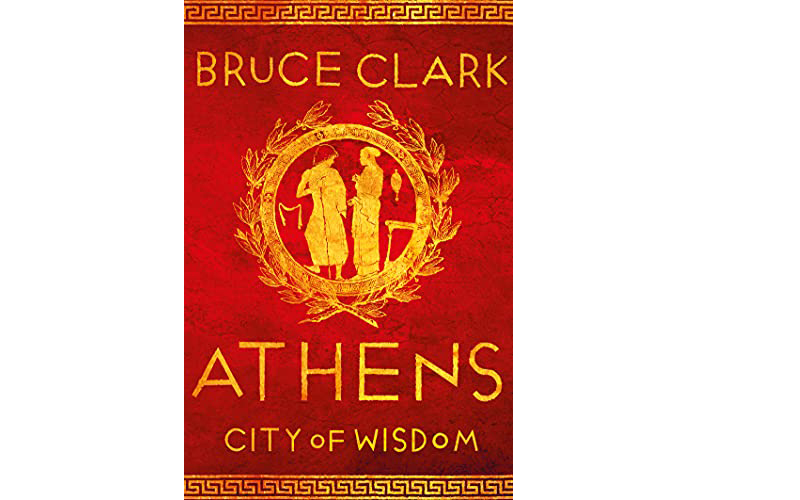What is there left to say about Athens? A place that grew from legend to history, produced democracy, philosophy and drama, and then vanished before reappearing as a fever dream of 19th century Romantics and then somehow grinding itself into a modern metropolis of concrete apartment blocks radiating out from that most awesome of monuments, the Parthenon.
It’s a seductive story, but not the whole picture. “Many histories of Athens have jumped from the Periclean period to the modern Greek kingdom,” writes Bruce Clark. “I felt there was a need to look at the intervening Byzantine, Frankish and Ottoman periods and see the points of continuity and discontinuity.”
Clark’s childhood love of Greece led him to a posting as Reuters correspondent in Athens during the 1980s, and although he may have left Greece, it has never left him. His widely praised previous book, “Twice a Stranger,” explored the 1923 Greek-Turkish population exchange, an epochal event in European history which remains relatively unknown outside the countries involved. Clark brings this same level of research and sensitivity to Athens, a city whose international brand often obscures a more complex reality.
Clark is well-prepared when it comes to Classical Athens, where his attention to detail is mollified by his engaging, often witty, writing style. His whimsical descriptions of ancient Athenian ostracism, “where at the start of each year, the electorate would vote on whether the atmosphere would be improved by throwing out one dislikeable character,” are particularly amusing, and it’s hard not to agree with him that “when functioning at its best, this Athenian democracy had a system of accountability which would put many of today’s imperfect states to shame.”
But it’s the later parts where the book really shines, as Clark accompanies us through the history of Athens’ Byzantine, Frankish and Ottoman periods – including that brief, rather surreal interlude when the city was administered by a company of Catalan pirates. All the time, the prose is enlivened by descriptions from contemporaries, such as Lord Byron, William Makepeace Thackeray and the grandiloquent Greek War of Independence hero Yannis Makriyannis.
As the book glides towards the period of living memory, Clark draws upon his work as a journalist in Athens in the 1980s. His measured and sensitive account of this period in Greek history makes a nice antidote to Robert Kaplan’s histrionic retelling in “Balkan Ghosts.” I was particularly moved by his vicarious accounts of the Nazi occupation and Greek Civil War where he benefits both from his self-effacing manner and illustrious choice of contacts.

The book brings us up to the present day, more or less, where Clark shows a particular interest in the re-emergence of Athens as a multicultural meeting place. Many foreign writers tend to ignore modern Athens altogether, instead retreating into a lofty nostalgia reminiscent of the Anglo-Romantics who toured Greece in the early 19th century, when the city lived larger in the imagination than in reality (though, as Clark points out, the romanticizing of Classical Athens began much earlier – in the 2nd century AD – when Herod of Atticus tried to re-establish the city in the vein of Plato.)
But Athens has always been a juxtaposition of beauty and ugliness, sacredness and profanity, democracy and autocracy, creation and destruction. Clark understands that the modern Athens is merely a logical continuation of this dialectic, rather than a temporary anomaly waiting to be rectified.
Clark has done an exceptional job pulling all these disparate threads together. The book never feels like an encyclopaedia but rather an anthology of short stories, at times funny, sad, thrilling and surreal, united by the city and inevitably gravitating towards its greatest monument. “Even in periods when Athens itself diminished to little more than a village, the Acropolis never ceased to be a place of spiritual and strategic importance,” writes Clark. “That important fact gives a certain coherence to the story of Athens.”
The characters themselves are a motley crew. The big names, from Pericles to Varoufakis, are well accounted for. But the book shines in its portrayals of some of the city’s unsung heroes, such as Revoula “Filothei” Benizelou, one of the city’s patron saints, whose posthumous hagiography has largely overshadowed her real life as a proto-feminist. It was also nice to see such a generous mention of Antonis Tritsis, the mercurial island boy who charmed his way into the role of Athens mayor and was responsible for much of the city’s aesthetic and environmental amelioration in the late 80s and early 90s. One wonderful anecdote, involving a meeting between Melina Mercouri and Vangelis, is buried deep within the “notes on sources” section, but worth digging for.
Despite its intimidating size, this is a comfortable, entertaining read which glides seamlessly from one chapter to the next. Clark is gifted with a polychromatic pallet of expressions, similes and allusions which he deploys with remarkable self-deprecation.
But perhaps his greatest achievement is rescuing Athens from its typecasting, as a formerly glorious city that has bottomed out. Athens may not be the Eternal City, but as Clark shows, it certainly is the Enduring City.
–
Alex Sakalis is a freelance journalist. “Athens: City of Wisdom” is published by Head of Zeus.
This article was previously published at ekathimerini.com.












